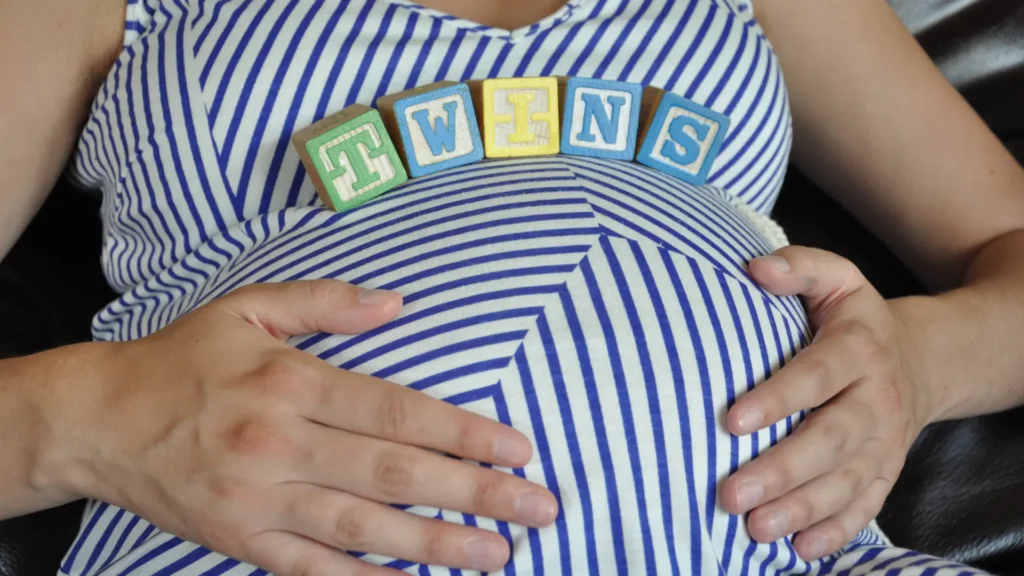Seeing those two little heartbeats on an early ultrasound scan is a moment of pure magic, often followed by a wave of surprise, excitement, and perhaps a few more questions than you initially anticipated! Discovering you are expecting twins or multiples is the start of a truly unique and special pregnancy journey.
My name is Dr. Vrushali Pillai, and as a Senior Consultant Obstetrician & Gynaecologist at Borneo Hospital, Thane – part of the Borneo Hospitals group serving families across Thane, Nashik, Chhatrapati Sambhaji Nagar, and Raipur City – I have had the privilege of guiding many families through the wonderful journey of a multiple pregnancy. We understand that while the prospect brings double the joy, it also requires a more specialised approach to care.
This article aims to be your comprehensive guide to Twin Pregnancy Care. We’ll explore what to expect physically and emotionally, explain the reasons for the extra monitoring you’ll receive, discuss potential complications we watch for, and outline how delivery and postpartum care might differ from a singleton pregnancy. The goal is to provide you with clear information, empowering you to embrace this special time with confidence and joy.
The Big News: Types of Twins & How They Are Diagnosed
A twin pregnancy is almost always diagnosed and confirmed during a routine early ultrasound scan. During this scan, one of the first things your doctor will assess is the type of twins you are carrying, as this guides the level of monitoring needed throughout your Twin Pregnancy Care plan.
In simple terms, there are two main types:
Fraternal (Dizygotic) Twins: These are the more common type, occurring when two separate eggs are fertilised by two separate sperm. Each baby has their own placenta and their own amniotic sac. Genetically, they are like any other siblings who just happen to be born at the same time.
Identical (Monozygotic) Twins: These twins result from a single fertilised egg that splits into two. Depending on when this split occurs, they may have separate placentas and sacs, or they may share a placenta and sometimes even an amniotic sac.
Your doctor at Borneo Hospital will pay close attention to this on your early scans. Knowing whether your twins share a placenta (known as being ‘monochorionic’) is very important, as these pregnancies require even closer monitoring for certain specific conditions.
What to Expect for Mum: Physical & Emotional Changes
Expecting two babies often means many of the normal pregnancy symptoms are amplified.
1. Exaggerated Early Symptoms:
In the first trimester, it’s common to experience more intense morning sickness, greater fatigue, and more significant breast tenderness due to higher levels of pregnancy hormones, particularly hCG.
2. More Rapid & Significant Weight Gain:
The recommended amount of weight gain for a twin pregnancy is higher than for a single baby. Your doctor will provide you with a personalised weight gain goal. The focus will be on healthy, nutrient-dense foods to support the growth of two babies.
3. Showing Earlier & Getting Bigger:
Your uterus needs to grow larger to accommodate two babies, so you will likely start showing a baby bump earlier and your abdomen will grow significantly larger than in a singleton pregnancy.
4. Increased Physical Discomforts:
As the pregnancy progresses, it’s common to experience more pronounced back pain, shortness of breath (as your uterus presses on your diaphragm), heartburn, constipation, and swelling (oedema) in your legs, ankles, and feet due to the increased size and weight.
5. The Emotional Rollercoaster:
The emotional experience can also be heightened. There’s often double the joy and excitement, but it’s also completely normal to feel double the anxiety and worry – about the pregnancy’s health, the delivery, and the practical aspects of preparing for and caring for two newborns at once.

Understanding the Risks: Why Twin Pregnancies Need Special Attention
A twin pregnancy is generally considered ‘high-risk’. This term isn’t meant to cause fear; it simply means that the pregnancy requires more careful surveillance and specialised Twin Pregnancy Care to manage the increased statistical likelihood of certain complications. Awareness is the key to proactive management.
Potential Maternal Risks:
- Pre-eclampsia: A condition involving high blood pressure and signs of stress on other organs is more common in multiple pregnancies.
- Gestational Diabetes Mellitus (GDM): The risk of developing pregnancy-related diabetes is higher.
- Anaemia: Iron-deficiency anaemia is very common due to the significantly increased demand for iron to support two babies, two placentas, and increased maternal blood volume.
- Postpartum Haemorrhage (PPH): There is a higher risk of heavy bleeding after delivery because the uterus has been stretched more, which can sometimes make it harder for it to contract down effectively after birth.
Potential Foetal/Pregnancy Risks:
- Preterm Labour and Birth: This is the most common complication of multiple pregnancies. The majority of twins are born before 37 weeks of gestation.
- Low Birth Weight: As a result of being born early and sharing the uterine space, twins often have a lower birth weight than singletons.
- Foetal Growth Restriction (FGR): One or both babies might not grow at the expected rate. Sometimes, a significant size difference can develop between the twins (known as discordant growth), which requires close monitoring.
- Twin-to-Twin Transfusion Syndrome (TTTS): This is a serious but rare condition that can only affect identical twins who share a single placenta (monochorionic). It involves an imbalanced flow of blood between the two babies through shared placental connections. This is a primary reason why monochorionic twin pregnancies undergo very frequent and detailed ultrasound scans.
Our team at Borneo Hospital is highly experienced in monitoring for these potential issues, allowing for early detection and effective management.
Specialised Twin Pregnancy Care: What Extra Monitoring Involves
Because of the unique considerations, your antenatal care plan will be more intensive. The team of doctors provide excellent care.
1. More Frequent Antenatal Visits:
You will have more frequent check-ups at Borneo Hospital than you would with a singleton pregnancy. This allows us to monitor your health (e.g., blood pressure, urine tests) and the babies’ progress more closely.
2. Increased Ultrasound Surveillance:
This is a critical component of Twin Pregnancy Care. You can expect to have ultrasound scans much more frequently, especially in the second and third trimesters (perhaps every 2-4 weeks). These scans are essential to:
- Monitor the individual growth of both babies and compare their sizes.
- Check the amniotic fluid levels around each baby.
- Assess the health and position of the placenta(s).
- Screen for specific complications like TTTS in monochorionic twins by looking at fluid levels and blood flow patterns.
3. Detailed Anomaly Scan:
This important scan, usually around 18-20 weeks, will be performed carefully for both babies to check their physical development and organ structures.
4. Foetal Well-being Tests:
It is more likely that you will have regular Non-Stress Tests (NSTs) or Biophysical Profiles (BPPs) in the third trimester to check on the babies’ well-being.
5. Comprehensive Nutritional Guidance:
Your nutritional needs are significantly increased. You’ll need more calories, protein, iron, folic acid, calcium, and other essential nutrients to support the growth of two babies. A consultation with a nutritionist, which we can facilitate at Borneo Hospital, is highly recommended to create a personalised diet plan.
6. Personalised Advice on Rest & Activity:
Due to the increased physical demands and higher risk of preterm labour, your doctor will likely advise you to get more rest, especially as you enter the third trimester, and may recommend stopping work earlier than with a single pregnancy.
Planning for Delivery: What to Expect with Twins
The final stage of your Twin Pregnancy Care involves careful planning for a safe delivery.
1. Timing of Delivery:
To reduce the risks associated with carrying a twin pregnancy too far, delivery is often planned for slightly earlier than the 40-week mark of a singleton pregnancy. The exact timing depends on the type of twins and whether any complications have arisen, but for uncomplicated dichorionic twins (separate placentas), delivery is often recommended around 37-38 weeks. Monochorionic twins are usually delivered a bit earlier, around 36-37 weeks. Your obstetrician at Borneo Hospital will discuss the optimal timing for your specific situation.
2. Mode of Delivery (Vaginal vs. Caesarean Section):
- The decision on how your babies will be born depends on many factors, including their positions (especially the first twin, Twin A), their well-being, your health, and the type of twins you are carrying.
- A vaginal delivery may be a safe option if Twin A is in a head-down position and there are no other complications.
- A Caesarean Section often recommended if the first twin is in a breech (bottom-first) position, if the babies share an amniotic sac (monoamniotic twins), if you have other complications like placenta praevia, or if issues arise during labour. The likelihood of needing a C-section is higher for a twin birth than for a singleton birth.
3. The Delivery Team:
Be reassured that a larger, expert team will be present at your delivery at Borneo Hospital. This typically includes your obstetrician, an anaesthetist, multiple skilled nurses and midwives, and a dedicated paediatric/neonatal team – often one for each baby – led by experts like our Founder, Dr. Santosh Madrewar.
4. NICU Readiness:
It is highly recommended that twins are delivered at a hospital with an advanced Neonatal Intensive Care Unit (NICU). Given the higher chance of prematurity or low birth weight, having immediate access to the expert medical care provided by Borneo Hospital’s Level III NICU offers a crucial safety net and peace of mind.

Postpartum: Recovery and Caring for Two
1. Maternal Recovery:
Your physical recovery after a twin birth can be more demanding, due to the more stretched uterus and higher chance of having had a C-section. Prioritising your rest and nutrition is vital.
2. Breastfeeding Twins:
Breastfeeding two babies is absolutely possible and many mothers do it successfully! It does, however, present unique challenges. Learning specific holds (like the ‘rugby hold’ for both babies at once) and getting support early on is key. We strongly recommend seeking help from our lactation consultants at Borneo Hospital to get off to the best possible start.
3. The Need for a Strong Support System:
This is critical. Caring for two newborns is wonderful but intense. Arrange as much practical help at home as you can for the early weeks and months – from your partner, family (parents, in-laws, siblings), or hired help if that is an option for you.
Expecting twins is a truly special journey, filled with double the excitement and double the love. Your Twin Pregnancy Care will be more specialised, involving extra monitoring and careful planning, all designed to ensure a safe and healthy outcome for you and your two little ones.
Frequent antenatal visits, detailed ultrasound scans, specific nutritional focus, and strategic delivery planning in a well-equipped hospital are the cornerstones of successful management. With expert obstetric and neonatal care from dedicated teams like ours at Borneo Hospital, you can navigate this unique pregnancy with confidence. We look forward to supporting you as you prepare for the incredible joy that awaits.



